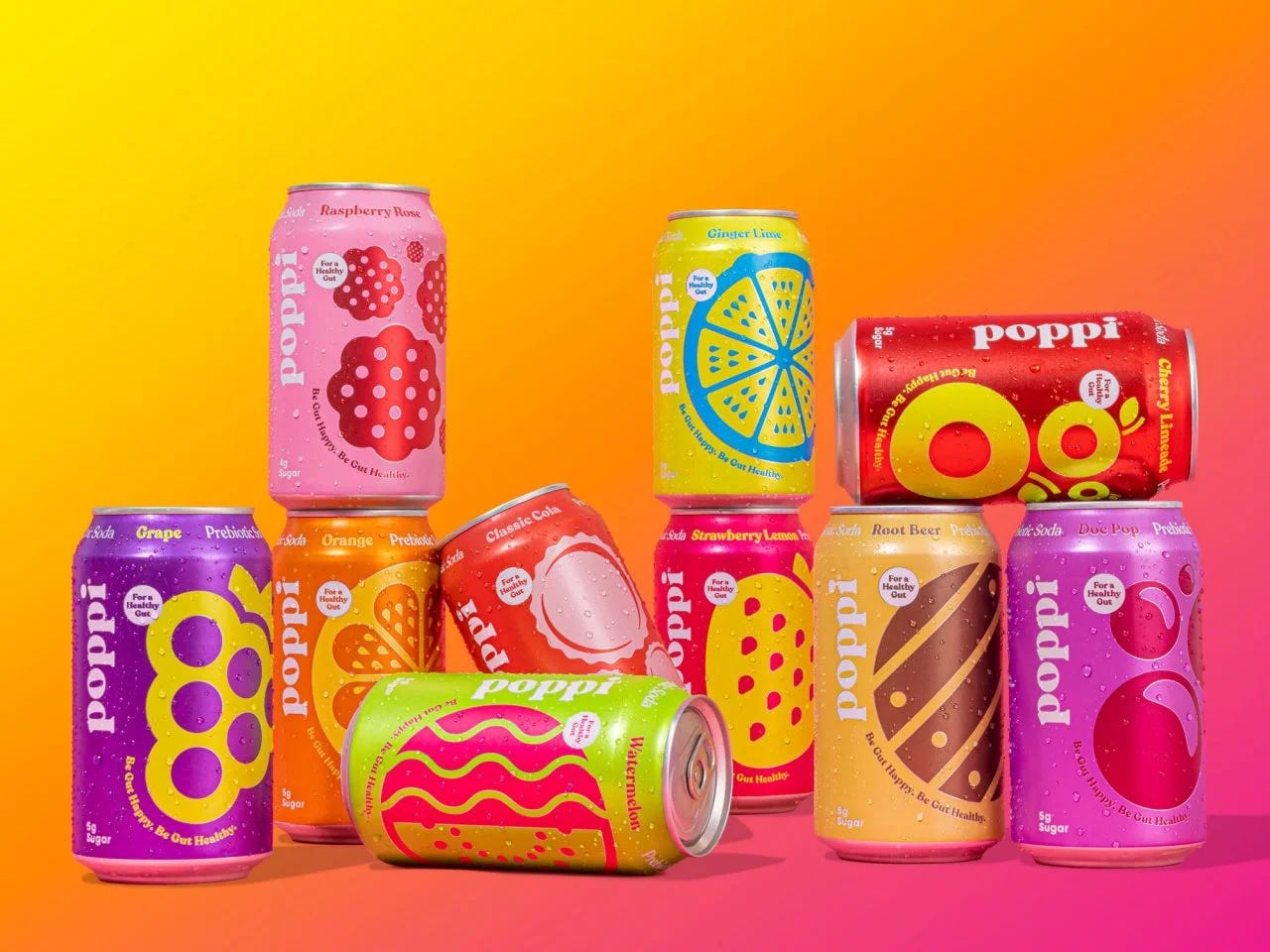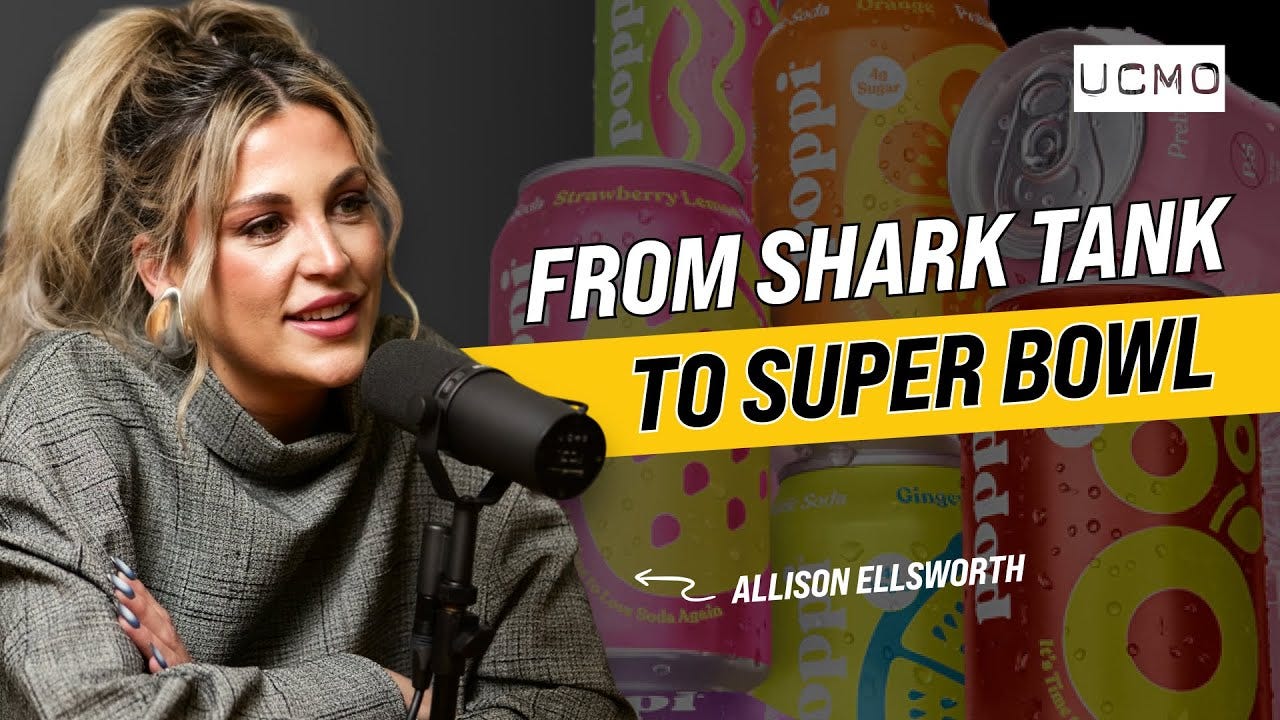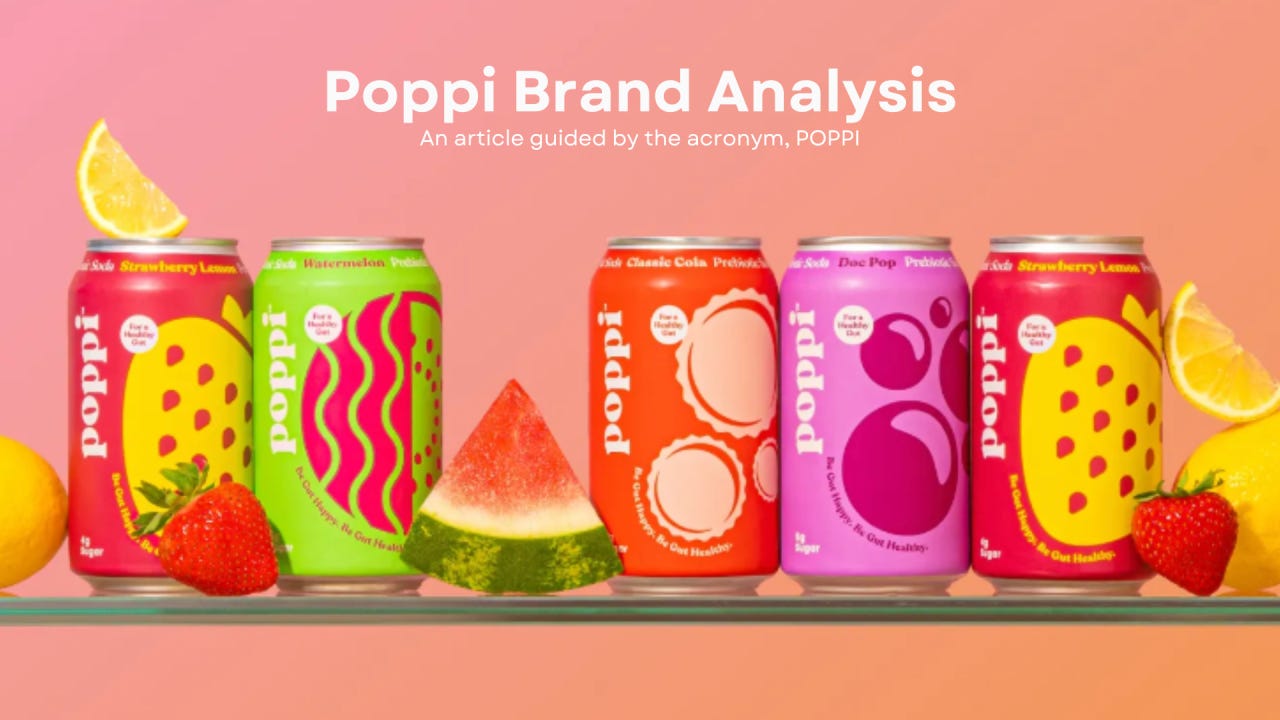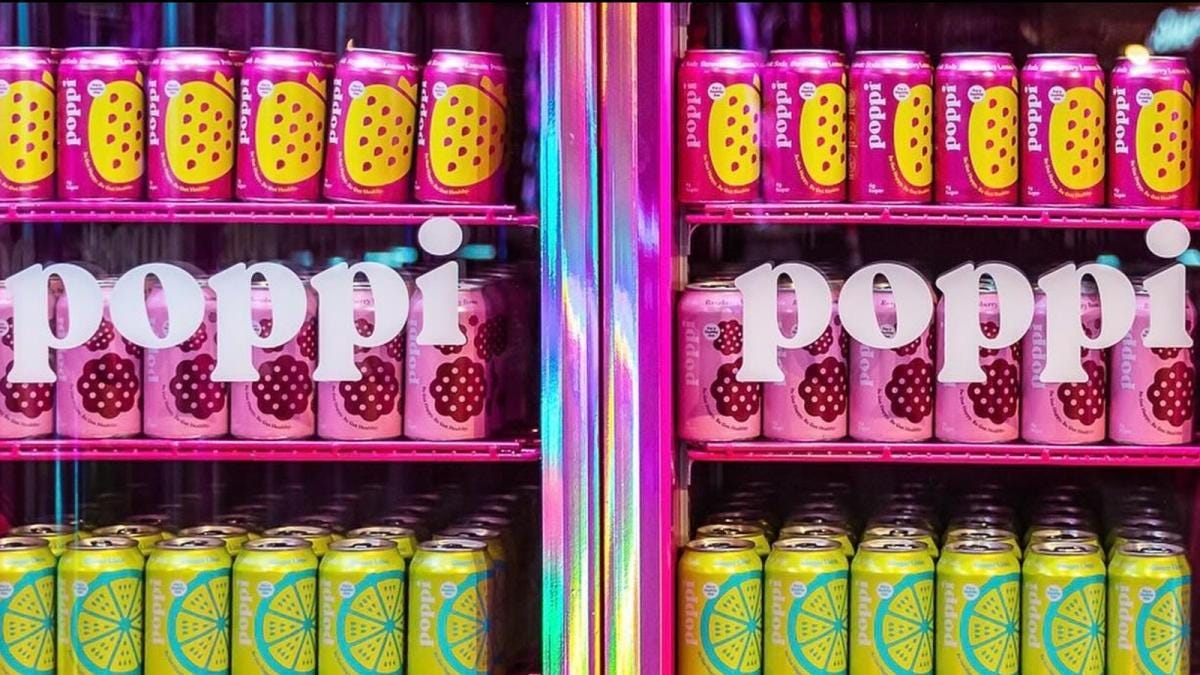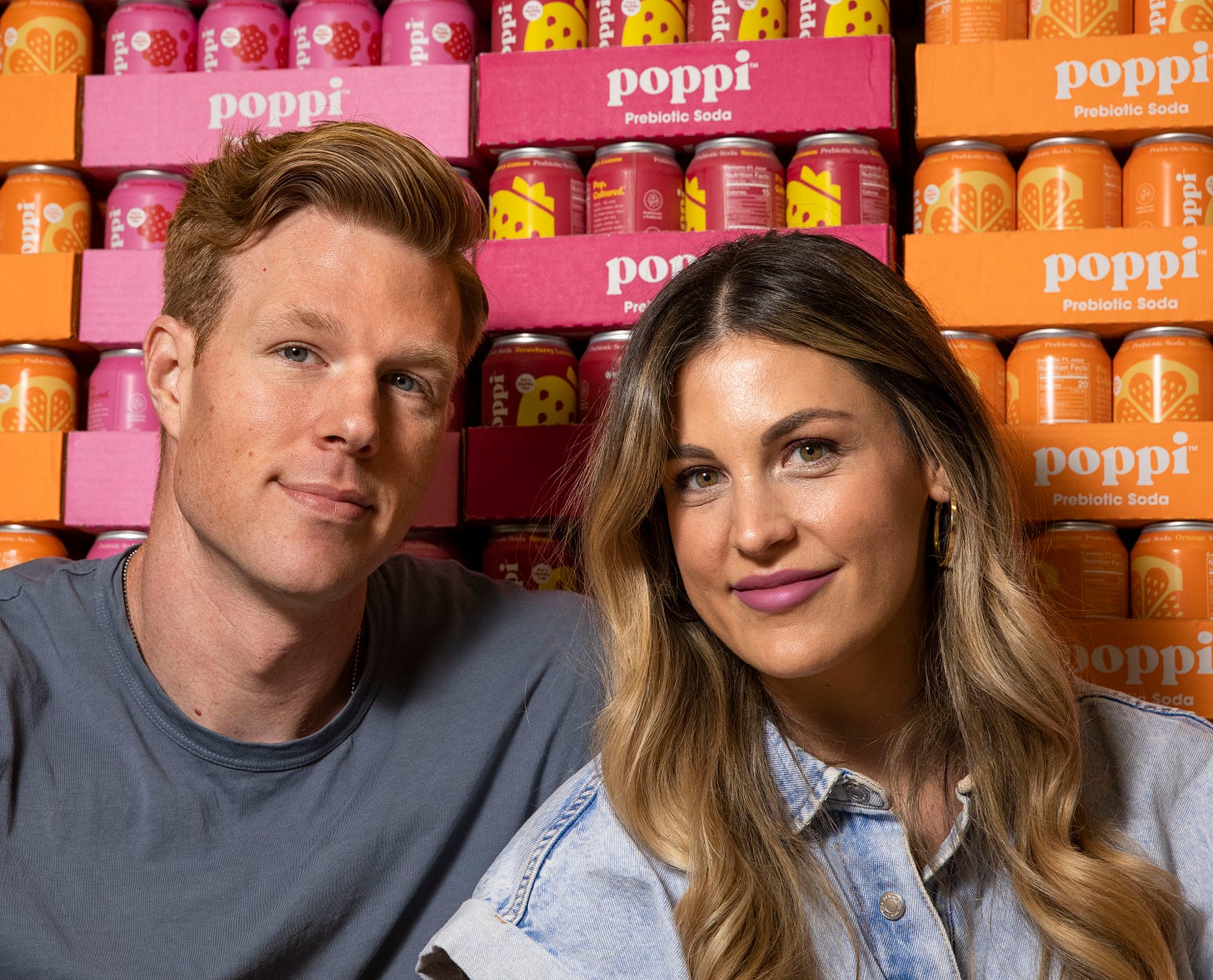From Farmers Market to $1.95 Billion: How Poppi's Gut-Friendly Soda Disrupted an Industry Giants Refused to Change
In an era where consumers increasingly reject sugar-laden sodas but still crave that familiar fizzy satisfaction, one couple's kitchen experiment has blossomed into perhaps the most remarkable beverage success story of the decade.
When Allison Ellsworth developed persistent digestive issues several years ago, she turned to an age-old folk remedy: apple cider vinegar. The remedy worked brilliantly—except for one problem. As anyone who's tried it knows, drinking straight apple cider vinegar is about as pleasant as gargling with battery acid.
"I hated the taste," Allison recalls, "but loved how it made me feel."
This tension—between effective health solutions and enjoyable consumption—sparked an idea that would eventually reshape the $200+ billion beverage industry: What if she could transform this ancient health tonic into something that actually tasted delicious?
Working alongside her husband Stephen in their Texas kitchen, Allison began experimenting with ways to mask apple cider vinegar's harsh flavor with fruit juices and carbonation. The result was a lightly sweetened, bubbly drink that delivered gut-friendly prebiotics in a package that looked and tasted like the sodas Americans love—but with only 5 grams of sugar per can.
Their homemade concoction quickly gained a following at local farmers markets in Dallas, where health-conscious shoppers couldn't get enough of this "healthy soda" alternative. But no one—least of all the Ellsworths—could have predicted how far this humble experiment would go.
Fast forward to March 2025: beverage behemoth PepsiCo has just announced its acquisition of Poppi for a staggering $1.95 billion.
Let's dive into how a farmers market stand transformed into a billion-dollar brand that forced even the biggest beverage companies in the world to rethink what modern consumers want in their sodas.
The Shark Tank Moment That Changed Everything
Like many entrepreneurial journeys, Poppi's big break came through a combination of preparation and good fortune. In 2018, the Ellsworths' creation (then called "Mother" beverage) caught the attention of producers from ABC's "Shark Tank."
Their episode aired in 2020, where they faced the intimidating panel of investors with their prebiotic soda. The product immediately attracted attention from Rohan Oza—renowned as the marketing genius behind brands like Vitaminwater and Smartwater.
"We had a pretty good product," Stephen later explained, "but Rohan showed us how to build a great brand."
With Oza's investment and mentorship through his firm CAVU Ventures, the Ellsworths rebranded as "Poppi" and set about transforming their farmers market favorite into a national sensation. The timing, though seemingly unfortunate—spring 2020, just as the pandemic lockdowns began—would prove surprisingly advantageous.
As Americans found themselves confined at home, increasingly ordering groceries online and scrolling endlessly through social media, Poppi was perfectly positioned to harness emerging digital channels that would soon redefine how new consumer products gain traction.
The TikTok Explosion That Traditional Brands Missed
While established soda companies were still heavily investing in traditional advertising channels, Poppi recognized early that TikTok represented the future of how young consumers discover products.
Rather than focusing exclusively on retailer relationships or conventional marketing, Poppi built a dual strategy: establishing a strong direct-to-consumer presence online while simultaneously working to get their vibrantly colored cans into the hands of influential content creators.
The approach paid extraordinary dividends when TikTok users began organically featuring Poppi in their content. Health and wellness influencers showcased the beverages in their "what I eat in a day" videos. Organization enthusiasts like Emily Mariko included rows of colorful Poppi cans in their aesthetic refrigerator restocking videos.
"We didn't invent this category," Allison has said, "but we did understand from the beginning that younger consumers were looking for better choices that still felt fun and indulgent."
Poppi actively cultivated these relationships, sending product to micro-influencers who aligned with their brand values. The company estimates their products have generated over 1 billion views on TikTok alone. This virality created a feedback loop: consumers would see Poppi on TikTok, search for it on Amazon or request it at their local stores, then post their own content after trying it—further amplifying awareness.
By late 2022, this social media momentum had translated into remarkable business metrics:
148% year-over-year revenue growth
250% increase in online sales
Presence in over 20,000 retail locations
The #1 bestselling soda on Amazon
Building a Brand That Looks and Feels Different
Scrolling through a grocery store beverage aisle can be a visual blur of similar-looking products. Poppi broke through this clutter with packaging that's instantly recognizable—vibrant, color-coded cans with simple, playful fruit illustrations and a distinctive lowercase "poppi" logo.
This wasn't just aesthetic preference; it was strategic positioning. Poppi's look communicates its core brand promise: this is something fun and upbeat (like traditional soda) but also modern and health-conscious.
"The branding is retro and futuristic at the same time," notes one design critic. "It feels nostalgic about soda's cultural place in America while signaling something entirely new."
Crucially, while competitors in the "better-for-you" beverage space often avoided the term "soda" entirely, Poppi embraced it. Their tagline—"Soda's back, but better"—directly addressed the tension many consumers feel: they love soda but know it's not good for them.
Poppi's distinctive voice extended beyond its packaging. The brand's social media presence maintained a playful, slightly irreverent tone that never took itself too seriously despite its health credentials. This approachability—being health-conscious without being preachy—resonated particularly with Gen Z and millennial consumers tired of clinical-feeling wellness products.
Omnichannel Success: From DTC to Everywhere

While many startup beverage brands focus exclusively on either direct-to-consumer channels or fighting for retail placement, Poppi pursued a sophisticated omnichannel strategy from early days.
This began with their Shopify-powered website and Amazon presence, where they ingeniously leveraged Amazon's fulfillment capabilities not just for marketplace orders but for their own direct orders as well. By using Amazon Multi-Channel Fulfillment (MCF), Poppi could sell through their website but have Amazon handle the shipping—reducing fulfillment costs by approximately 30% per order and ensuring quick delivery without building their own distribution network.
But unlike some digitally-native brands that view retail as an afterthought, Poppi aggressively pursued brick-and-mortar placement from the beginning. Following Rohan Oza's advice, they invested early in building a Direct Store Delivery (DSD) network—the distribution system used by major beverage companies to ensure frequent restocking and prime shelf placement.
By 2023, Poppi had secured prominent placement across a remarkable range of retailers:
Natural grocers like Whole Foods Market
Mass merchandisers including Target and Walmart
Club stores such as Costco and Sam's Club
Convenience chains like 7-Eleven and Circle K
Regional grocers including Kroger, Publix, and Albertsons
The brand's retail strategy included eye-catching in-store displays, such as heart-shaped towers of Poppi cans for Valentine's Day. By 2024, Poppi was available in over 30,000 retail locations nationwide—and sales were exceeding $100 million annually.
Premium Pricing That Still Feels Accessible
Poppi's pricing strategy balanced the need to maintain premium positioning with the desire to reach mainstream consumers.
A single can typically retails for $2.49-$2.99—significantly more than traditional soda but in line with other functional beverages. Twelve-packs on Amazon sell for approximately $29.99 (about $2.50 per can), with subscriptions offering 5-15% savings.
This premium pricing is justified by the product's functional benefits, particularly its prebiotic properties and low sugar content. Poppi emphasized that paying more for a healthier soda alternative was a worthwhile trade-off.
However, the brand also created strategic entry points for more price-sensitive consumers through:
Variety packs encouraging trial across flavors
Bulk options at club stores with lower per-unit prices
Periodic promotions and discounts
Subscription savings for loyal customers
This tiered approach allowed Poppi to maintain its premium image while gradually expanding accessibility. For many consumers, Poppi occupied a sweet spot: more affordable than daily specialty coffee but still feeling like a permissible treat.
The Final Push to Big-League Status
By early 2024, Poppi's growth had attracted serious attention from beverage industry giants. Rumors circulated that Coca-Cola was eyeing the brand for acquisition—speculation fueled when Coke hurriedly launched its own similar product called "Simply Pop."
In a strategic move that significantly raised Poppi's profile, the company ran a regional Super Bowl commercial featuring TikTok star Alix Earle—an unusual choice over traditional celebrities, but one perfectly aligned with Poppi's social-first strategy. The spot generated millions of new consumer impressions and reinforced Poppi's growing cultural relevance.
While Allison Ellsworth publicly denied acquisition talks in mid-2024, stating "we're just focusing on growth," behind the scenes, the company was likely fielding offers. Poppi continued launching new flavors and building its community, ensuring any potential acquirer would need to pay a premium.
That premium came in March 2025, when PepsiCo announced it would acquire Poppi for $1.95 billion—a remarkable valuation for a brand less than five years old.
Ramon Laguarta, PepsiCo's Chairman and CEO, explained the strategic rationale: "Consumers increasingly want great-tasting options that fit their lifestyle and interest in health and wellness. Poppi is a great complement to meet these needs."
For PepsiCo, the acquisition represents more than just adding another brand to its portfolio—it's an acknowledgment that the future of soda looks dramatically different from its past. For the Ellsworths, it's a validation of their vision to transform an age-old remedy into a modern beverage sensation.
Key Lessons From Poppi's Meteoric Rise
For entrepreneurs and brand builders, Poppi's journey from farmers market to billion-dollar acquisition offers several valuable lessons:
1. Solve a genuine tension
Poppi addressed a real consumer paradox: people love soda but increasingly reject its sugar content and artificial ingredients. By delivering the experience of soda with significant health benefits, they created something genuinely unique.
2. Build community before scale
Rather than immediately chasing mass distribution, Poppi cultivated passionate early adopters who became evangelists for the brand. This community-first approach created authentic momentum that large competitors couldn't easily replicate.
3. Embrace omnichannel synergy
Unlike brands that pit online against offline channels, Poppi recognized how they could reinforce each other: social media drove awareness, which led to retail trials, which prompted more social sharing. This virtuous cycle accelerated growth across all channels.
4. Make health accessible and fun
Poppi avoided the clinical, serious tone common to many health products. By making prebiotics approachable and even playful, they broadened their appeal beyond health enthusiasts to reach mainstream consumers.
5. Understand the new path to consumer relevance
Traditional beverage launches relied heavily on advertising and retail promotions. Poppi recognized that cultural relevance now flows through social platforms and influencer relationships—and mastered this new landscape before larger competitors could respond.
What's Next for Poppi?
With PepsiCo's global distribution network and marketing muscle now behind it, Poppi is positioned for exponential growth. The company's founders have indicated they'll remain involved as the brand expands internationally and continues developing new flavors.
"We never imagined how many people we could reach," Allison reflected in the acquisition announcement. "We can't wait to begin this next chapter with PepsiCo to bring our soda to more people around the world."
For an industry long dominated by century-old brands reluctant to change their formulas, Poppi represents a watershed moment—proof that today's consumers are ready to embrace alternatives that don't force them to choose between enjoyment and health consciousness.
What began as a simple quest to make apple cider vinegar palatable has ended up transforming an entire beverage category. And for entrepreneurs everywhere, Poppi's journey from kitchen experiment to billion-dollar brand serves as an inspiring reminder: sometimes the best disruption comes not from complex technology, but from reimagining the most familiar products in our daily lives.


